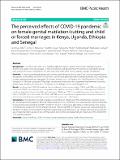| dc.contributor.author | Esho, Tammary | |
| dc.contributor.author | Matanda, Dennis J. | |
| dc.contributor.author | Abuya, Timothy | |
| dc.contributor.author | Abebe, Sintayehu | |
| dc.contributor.author | Hailu, Yeshitila | |
| dc.contributor.author | Camara, Khaltoume | |
| dc.contributor.author | Mouhammed, Bachir | |
| dc.contributor.author | Kapsandui, Tonny | |
| dc.contributor.author | Kamanzi, Lilian | |
| dc.contributor.author | Wabwire, Andrew | |
| dc.contributor.author | Kagurusi, Patrick | |
| dc.contributor.author | Nankanja, Maureen | |
| dc.contributor.author | Gitimu, Anne | |
| dc.contributor.author | Kawai, David | |
| dc.contributor.author | Kogada, John | |
| dc.contributor.author | Ondigo, Millicent | |
| dc.contributor.author | Osur, Joachim | |
| dc.date.accessioned | 2022-05-10T07:29:48Z | |
| dc.date.available | 2022-05-10T07:29:48Z | |
| dc.date.issued | 2022-03-29 | |
| dc.identifier.citation | Esho, T., Matanda, D.J., Abuya, T. et al. The perceived effects of COVID-19 pandemic on female genital mutilation/cutting and child or forced marriages in Kenya, Uganda, Ethiopia and Senegal. BMC Public Health 22, 601 (2022). https://doi.org/10.1186/s12889-022-13043-w | en_US |
| dc.identifier.other | DOI: 10.1186/s12889-022-13043-w | |
| dc.identifier.uri | https://repository.amref.ac.ke/handle/123456789/689 | |
| dc.description | © The Author(s) 2022. Open Access This article is licensed under a Creative Commons Attribution 4.0 International License, which
permits use, sharing, adaptation, distribution and reproduction in any medium or format, as long as you give appropriate credit to the
original author(s) and the source, provide a link to the Creative Commons licence, and indicate if changes were made. The images or
other third party material in this article are included in the article’s Creative Commons licence, unless indicated otherwise in a credit line
to the material. If material is not included in the article’s Creative Commons licence and your intended use is not permitted by statutory
regulation or exceeds the permitted use, you will need to obtain permission directly from the copyright holder. To view a copy of this
licence, visit http:// creat iveco mmons. org/ licen ses/ by/4. 0/. The Creative Commons Public Domain Dedication waiver (http:// creat iveco
mmons. org/ publi cdoma in/ zero/1. 0/) applies to the data made available in this article, unless otherwise stated in a credit line to the data. | en_US |
| dc.description.abstract | Background: The effects of COVID-19 on harmful traditional practices such Female Genital Mutilation/Cutting
(FGM/C) and Child or Forced Marriages (CFM) have not been well documented. We examined respondents’ perceptions
on how the COVID-19 pandemic has affected FGM/C and CFM in Kenya, Uganda, Senegal, and Ethiopia.
Methods: A cross-sectional study design with a mixed methods approach was used. Data collection on participants’
perceptions on the effects of COVID-19 on FGM/C and CFM took place between October-December 2020. Household
surveys targeting women and men aged 15–49 years in Kenya (n = 312), Uganda (n = 278), Ethiopia (n = 251), and
Senegal (n = 208) were conducted. Thirty-eight key informant interviews with programme implementers and policymakers
were carried out in Kenya (n = 17), Uganda (n = 9), Ethiopia (n = 8), and Senegal (n = 4).
Results: In Kenya, the COVID-19 pandemic has contributed to the increase in both FGM/C and CFM cases. Minimal
increase of FGM/C cases was reported in Uganda and a significant increase in CFM cases. In Ethiopia, the COVID-19
pandemic had a limited perceived effect on changes in FGM/C and CFM. In Senegal, there were minimal perceived
effects of COVID-19 on the number of FGM/C and CFM cases. The pandemic negatively affected implementation of
interventions by the justice and legal system, the health system, and civil societies.
Conclusions: The pandemic has had varied perceived effects on FGM/C and CFM across the four countries. Generally,
the pandemic has negatively affected implementation of interventions by the various sectors that are responsible
for preventing and responding to FGM/C and CFM. This calls for innovative approaches in intervening in the various
communities to ensure that women and girls at risk of FGM/C and CFM or in need of services are reached during the
pandemic. Evidence on how effective alternative approaches such as the use of call centres, radio talk shows and the
use of local champions as part of risk communication in preventing and responding to FGM/C and CFM amid COVID-
19 is urgently required. | en_US |
| dc.description.sponsorship | Amref End FGM/C Centre of Excellence | en_US |
| dc.language.iso | en | en_US |
| dc.publisher | BMC Public Health | en_US |
| dc.subject | Perceived effects | en_US |
| dc.subject | COVID-19 | en_US |
| dc.subject | Female genital mutilation/cutting | en_US |
| dc.subject | Child or forced marriage | en_US |
| dc.title | The Perceived Effects of COVID‑19 Pandemic on Female Genital Mutilation/Cutting and Child or Forced Marriages in Kenya, Uganda, Ethiopia and Senegal | en_US |
| dc.type | Article, Journal | en_US |

